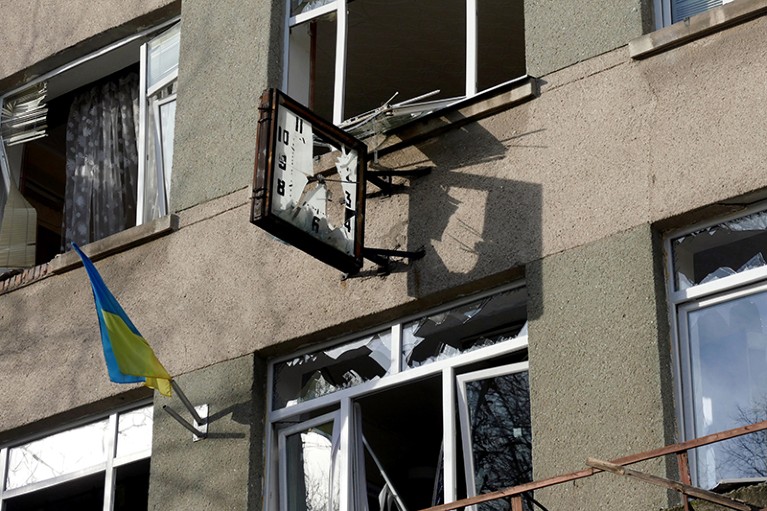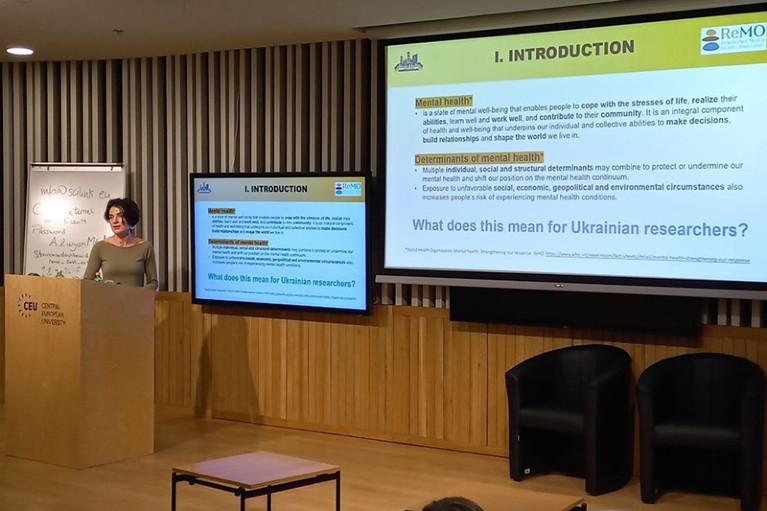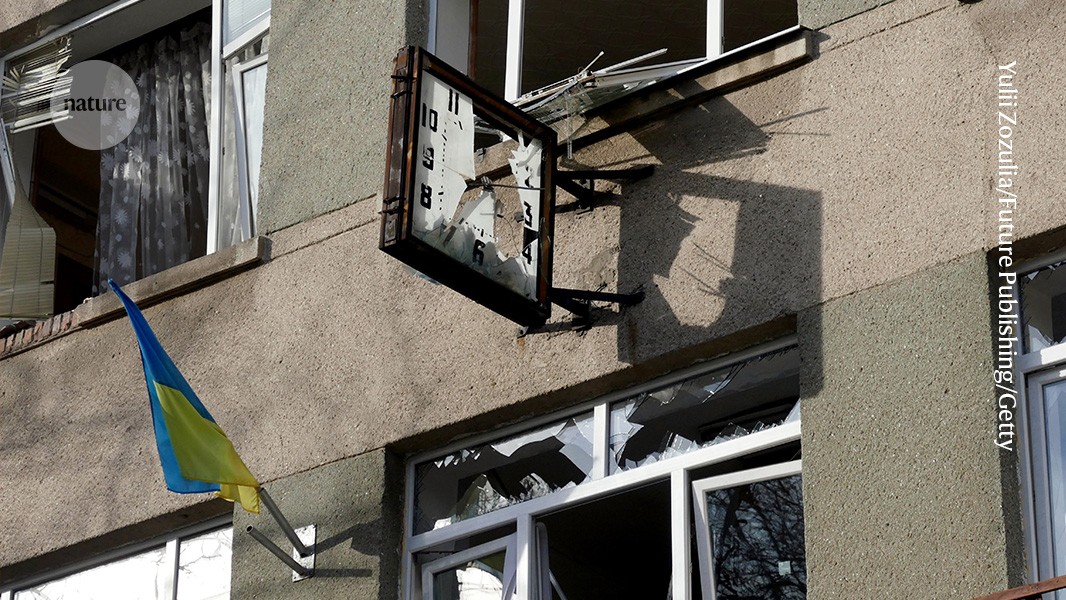
Many universities and public buildings in Ukraine have been destroyed during the war.Credit: Yulii Zozulia/Future Publishing/Getty
After Berdiansk in eastern Ukraine was occupied by Russian forces in March 2022, living and working safely became nearly impossible, especially for those unwilling to work under the Russian authorities. As a result, our university, Berdyansk State Pedagogical University, now operates only virtually.
Our academic community will never forget this period. No one knew what lay ahead: constant power cuts, unstable Internet, the fear of missile attacks and frequent air-raid alarms. We spent our days searching for a phone signal, food and electricity — these resources were scarce. Whenever we found mobile coverage, we called and wrote to each other — colleagues, students and the administration — sharing information, discussing concerns and trying to address the many questions about surviving under occupation. These calls made both of us realize the importance of support, communication and having like-minded individuals around us. At the same time, the experience taught us to value things we once took for granted.
After being forcibly displaced to different regions in Ukraine, we realized that the best way to express ourselves and draw attention to the crisis was through research. Shifting our focus from nanotechnology (Y.S.) and teaching excellence in higher education (N.T.), we decided to collaborate to investigate the impact of the war on Ukrainian academics.
Before the war, we were a university administrator (Y.S.) and an associate professor of psychology (N.T.) — we often felt that our work was underfunded, and that we were in a rut when it came to our scientific contributions. Now, however, our new research focus has become our raison d’être, redefining our academic purpose. By sharing our findings, we reach policymakers, international organizations and academic communities.
Our studies have included several rounds of surveys of more than 1,500 Ukrainian academics, investigating the challenges they face and their needs during the war, as well as around 100 interviews with displaced researchers to explore their experiences with adapting, resuming scientific activity and mental health. Our studies also document the war’s long-term impacts on higher education and science. For us, this is more than just research — it’s a way to tell the truth about the war’s impact on the academic community, and to guard the scientific front while soldiers on the front lines defend our country.
At the beginning of the war, our research focused on the challenges faced by academics at relocated universities. We investigated the ability of both those who relocated and those who remained under occupation to continue their research, and explored how to support our colleagues. We also studied the university relocation process, documenting these experiences in publications.
Science under air raids
Our research had two key findings1. First, Ukrainian academics forced to work under wartime conditions face challenges that make scientific activity nearly impossible. Issues such as poor Internet connectivity, loss of infrastructure and the growing sense that pre-war research projects are no longer relevant significantly hinder progress. Therefore, targeted support from the global scientific community has been crucial to address the daily struggles of Ukrainian academics, who remain determined to continue their work, whether in bomb shelters, remotely from various Ukrainian cities (including those under Russian occupation) or from abroad.

Natalia Tsybuliak presents her research on the mental health of Ukranian researchers during the war.Credit: Natalia Tsybuliak
Second, although mobility programmes offered new research opportunities abroad, many displaced Ukrainian academics struggled to return to their pre-war levels of scientific activity. For many, the psychological and logistical challenges of resettlement hampered their ability to contribute fully. And many displaced scientists had to shift their research focus. Given these challenges, supporting researchers who remain in Ukraine through remote collaborations could be a more effective solution for both short- and long-term outcomes.
We also studied the university relocation process, focusing on the resilience of institutions such as Berdyansk State, which adopted a ‘university without walls’ model: giving up on a physical location, and instead running as an entirely virtual university2. Despite losing access to its physical campus, the university continues to operate online, carrying out its three core functions: teaching, research and serving the displaced community. We estimate that there are 28 other relocated Ukrainian universities that have developed various strategies to continue operating.
We analysed key hurdles, such as the loss of material resources, personnel retention and maintaining academic continuity. Despite these difficulties, the university retained around 80% of its staff and student body after the virtual transition. The rapid shift to remote teaching and learning highlighted the importance of reliable digital platforms. Studying the experiences of Berdyansk State and other relocated universities helps to inform policy development aimed at better supporting the academic community in military conflict zones, especially if university buildings are reduced to rubble — as has been seen not only in Ukraine, but also in other conflict regions, such as Gaza.
Health in wartime
Another focus was the mental health of Ukrainian academics. We have already uncovered alarming rates of burnout3. Our findings show that burnout is most severe among those who have been internally or externally displaced. Unsurprisingly, 48% of men and 61% of women experienced high levels of emotional exhaustion during the war. Contributing factors include deteriorating security, economic instability and increased professional workloads.
Displaced academics have taken on heavier teaching loads, adapting their course content and teaching methods to digital, flexible formats. Many are also mentoring more students, offering support for each student during wartime and managing increased administrative duties as they navigate new operational challenges. Displaced academics, in particular, have limited resources and must rebuild their work in new environments. They also reported dealing with isolation, losing social ties in their original communities and struggling to form new ones.
We further investigated anxiety among Ukrainian academics two years into the full-scale war: 44% of participants reported experiencing moderate to severe anxiety4. In peacetime, anxiety levels among academic staff typically ranged from 26% to 38%. Male academic staff members reported higher anxiety levels than did their female counterparts, a reversal of typical peacetime trends. Displaced academics experienced higher levels of severe anxiety than did those who remained in place.
In times of crisis, science has become our way to survive and understand and contribute to something greater than ourselves. In the darkest moments, we found light in our research, which continues to guide us as we navigate these stormy waters. Science is not just a job. It’s a path to understanding ourselves and the abnormality around us — a path that gives us strength and faith.


